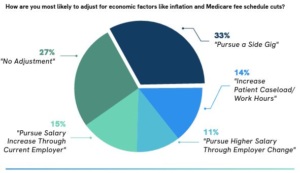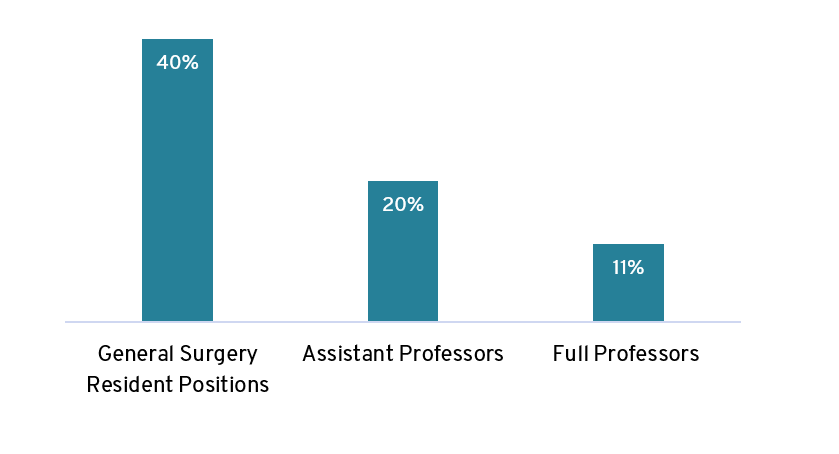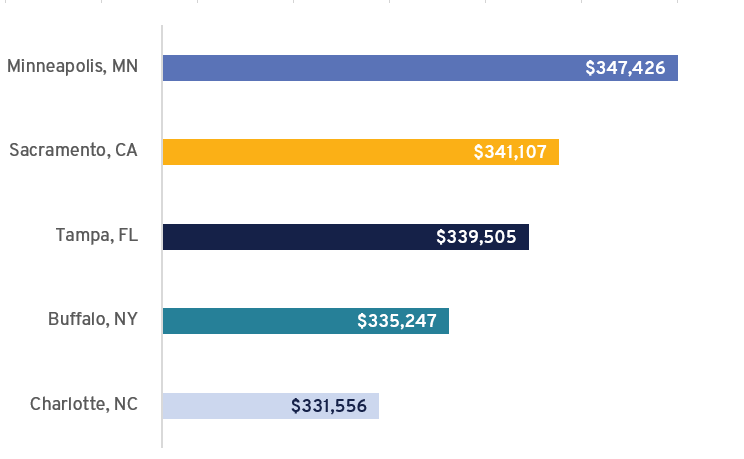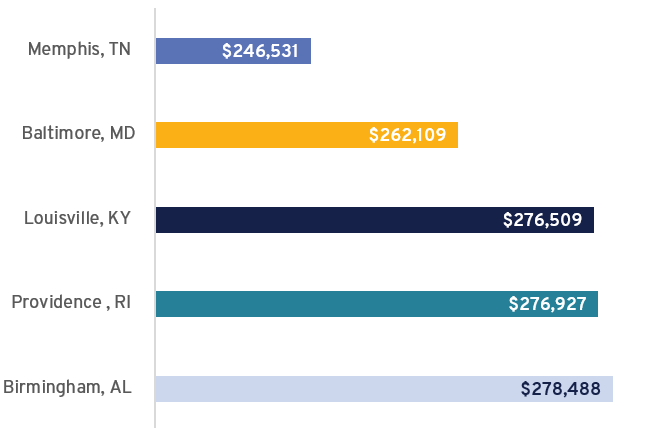2023 Doximity Physician Compensation Report
U.S. healthcare workers face a number of pressures in their jobs today, including economic strains, a growing physician shortage, and high rates of work-related burnout. These challenges drive many medical professionals to reassess their careers, explore opportunities for greater autonomy and work-life balance, and in certain cases, even consider new career pursuits outside of medicine altogether.
Doximity’s report shows that the average pay for doctors did not increase in 2022. In fact, their study suggests a slight decline of 2.4%, compared to an increase of 3.8% in 2021. It is clear physician salaries did not keep pace with the high rate of inflation in 2022. As a result, many doctors experienced a decline in real income, as inflation ran rampant.
Impact of Economic Factors on Career Plans

The Gender Wage Gap
According to the newly released Doximity 2023 Physician Compensation Report, “the Physician Gender Pay Gap at 26% remains substantial, with women physicians earning nearly $110,000 less than men physicians, on average, even when salaries were controlled for specialty, location, and years of experience.
In 2020, an analysis of our physician compensation data from 2014-2019 estimated that over the course of a career, men physicians make over $2 million more than women physicians.” Combined with this new data, these results emphasize the continued importance of increasing gender pay transparency and equity in health care.
Source: 2023 Doximity Physician Compensation Report
Are you interested in reviewing your salary? SCC can help you determine a fair salary based on your unique location, skills, and specialty. Contact us to learn more.
When You’re Clear, You Can Choose What You Want to Negotiate
RESOURCE CREATED BY: HARVARD KENNEDY SCHOOL
This article was written by Hannah Riley Bowles, Linda Babcock, and Kathleen McGinn, and was originally published by the Journal of Personality and Social Psychology in March 2005.
Gender gaps are more likely to emerge in negotiations when there is a lack of clarity about compensation or price standards.
Introduction
Women have been shown to ask for and receive less than their male counterparts in salary negotiations. This initial wage gap continues to increase over the span of a career, leaving women with a significant lifetime wage deficit relative to men. To close this gap, it is necessary to understand the factors behind the difference in men and women’s negotiation outcomes. One contributing factor could be the opaque nature of comparative salaries. A person negotiating a salary rarely has access to the full range of information that could be considered in the decision. And the greater the ambiguity in the negotiation, the more unconscious gender biases may work for or against a candidate.
Findings
In negotiations where more information is available on the criteria on which decisions are made, the difference between men’s and women’s negotiation outcomes disappears. In negotiations with opaque information, women get better results than men when negotiating on behalf of someone else rather than for themselves.
- In job negotiations with clear industry standards, there were no differences in salaries negotiated by men and women. When industry standards were unclear, female MBAs accepted wages that were, on average, $10,000 lower than those accepted by male MBAs.
- When price comparisons were not available, male buyers paid 27% less for a good than their female counterparts. However, when price standards were clear, the difference disappeared.
- Female and male executives negotiated equal compensation agreements when negotiating for themselves, but the female executives secured much higher salaries when they were negotiating for their subordinates. Male executives, however, were unaffected by this distinction.
In short, ambiguity heightens the potential for gender to play a role in price and salary negotiations, while clarity diminishes gender differences in bargaining outcomes.
Read the full article here.
ARE YOU EXPERIENCING gender gaps in your position? CONTACT US FOR A FREE CONSULTATION TO EXPLORE WAYS SCC CAN EMPOWER YOU.
How to Close the Gender Pay Gap in U.S. Medicine
by Lisa S. Rotenstein and Jessica Dudley
Data from the Harvard Kennedy School shows that women negotiate for lower compensation than men do in the absence of clear industry standards but negotiate for equal salaries when standard salary information was available, suggesting the value of creating environments in which information about compensation is shared across gender lines.
Indefensible differences in salary between women and men persist in medicine, with female primary care and specialist doctors earning 25% and 36% less, respectively, than their male counterparts. These differences are especially egregious given that female physicians actually outperform male physicians in some areas. It’s hard to imagine by what calculus a healthcare organization would pay women less than men for their better outcomes. The solutions to this unacceptable state include transparency around salary data, focused coaching and sponsorship, and equitable promotions.
Organizations should pursue three approaches to address the problem:
- Enhance Salary Data and Transparency for Total Compensation
- Engage Allies in Coaching and Sponsorship
- Facilitate Equitable Promotion
Read the full Harvard Business Review article here.
CONTACT US FOR A FREE CONSULTATION TO LEARN HOW SCC CAN HELP VERIFY YOU ARE GETTING PAID WHAT YOU ARE WORTH!
Dismantling “Benevolent” Sexism
How you respond to sexism in the workplace matters.
“While men should continue interrupting sexism at work, they should also recognize that some responses may not be as effective as they think.”
Sexism can persist in a variety of forms including benevolent sexism and hostile sexism.
Benevolent sexism is defined by “attitudes, practices, and actions that seem positive — such as aid, flattery, and rewards — but that undercut their goal of supporting women at work, often under the pretense of providing them with help, protection, compliments, and affection.”
The consequences of perpetuating both benevolent and hostile sexism for women in the workspace are identical:
- negative impacts on mental and physical health
- increased feelings of incompetence
- less career support
Common misbeliefs that promote benevolent sexism:
Misbelief #1: Men are responsible for women.
Example: Not offering a woman a high-visibility project or challenging international assignment because she has young children.
Misbelief #2: Men and women are different and complementary.
Example: Suggesting that a woman would be better suited for a position in HR rather than sales.
Misbelief #3: Men’s personal lives depend on women.
Example: Complimenting a woman colleague’s appearance and commenting that her husband is a lucky man.
The misbeliefs highlighted above can seem positive. Before calling out sexism, one should consider whether the response reinforces harmful beliefs about gender.
This study found that “the higher a man’s position in the corporate hierarchy, the more likely he is to say he’d respond in a benevolently sexist manner. As the most senior leaders of their organizations, these men are not only undermining the women they want to support but also modeling harmful behavior to other managers.”
How Men Can Interrupt Sexism at Work
Increase your awareness.
What assumptions do you make about how people should or should not behave based on their gender? Are you making an effort to learn more about how benevolent sexism effects the workplace?
Deepen your reflection.
What are the assumptions behind your words? What impact will your actions have? Are you implying that women can’t or shouldn’t do a project or task themselves?
Apply your knowledge.
If you hear others making benevolently sexist comments, challenge them. For example, if a colleague wants to “save” a woman from a complex project, help him zoom out by asking, “What are the consequences of not involving her in this project? Wouldn’t it be better to ask her directly instead of assuming she won’t want it?”
Praise others who interrupt benevolent sexism.
Acknowledge colleagues who interrupt benevolently sexist behavior. For example, reach out to a team member to say, “What you did made a positive impact on the team.”
Model equitable behavior.
Focus on women employees’ competencies rather than on traits such as style or appearance. Give feedback related to work results and objective goals instead of characteristics stereotypically associated with women, such as warmth or likeability.
Start conversations.
The key to having comfortable conversations surrounding sexism is to approach the conversation with curiosity with the aim of education, rather than blame.
Women can play a role in dismantling sexism as well. By practicing the methods identified previously, women can identify when benevolent sexism occurs and address the behavior effectively.
When women succeed, we all succeed.
Read the full Harvard Business Review article by Negin Sattari, Sarah H. DiMuccio, Joy Ohm, and Jose M. Romero here.
Why So Many Women Physicians Are Quitting
Why does practicing medicine take a greater toll on women?
Compared to men, women physicians spend more time per patient, documenting electronic medical records, and handling non-professional responsibilities.
As a result, women physicians have higher rates of burnout and depression and lower rates of professional fulfillment.
These findings also shed light on other differences between female and male physicians in the following:
- Alignment: the relationship and shared values physicians have with organizational leadership
- Resilience: the ability to find meaning in work and the ability to re-charge when away from work
- Intent to stay: the likelihood to remain with the organization three years from now
How can we level the playing field?
Organizations must focus on:
Flexibility to meet both professional and personal demands.
Respect strategies for encouraging inclusive workplace culture.
Equitable Advancement Opportunities and Pay reviewing current and new compensation plans to ensure gender pay equity.
Ask yourself, is your practice a good place for women physicians to work?
SCC is committed to ensuring pay equality for all surgeons. We are passionate about educating female physicians in the business of medicine.
Knowledge is power. Know your value.
Learn about fair market value salary and negotiate your worth.
Contact us for a free consultation today.
Source: Why So Many Women Physicians Are Quitting was written by Jessica Dudley, Sarah McLaughlin, and Thomas H. Lee, and published by the Harvard Business Review.
2021 Doximity Physician Compensation Report
The 2021 Doximity data showed there are no medical specialties in which women earned the same or more than men in 2021.
“The physician gender pay gap has increased over the last five years, even when controlled for specialty, location, and years of experience.
In 2021, the gender pay gap was 28.2%, which represents over $122,000 difference in compensation in one year.
An analysis of our physician compensation data from 2014-2019 estimated that over the course of a career, male physicians make over $2 million more than female physicians.”
The largest pay gaps between men and women were in the following specialties:
- Oral & Maxillofacial Surgery
- Allergy & Immunology
- Otolaryngology
- Pediatric Nephrology
- Thoracic Surgery
Metro Areas with the Highest
Compensation for Women
Metro Areas with the Lowest
Compensation for Women
Source: Doximity, 2021 Physician Compensation Report
Schedule a free consultation to discover how we can help you earn equal pay.
Gender Equity Toolkit
Association of Women Surgeons (AWS) is a nonprofit organization dedicated to enhancing the interaction and exchange of information between women surgeons. The following Gender Equity Toolkit provides research and resources for career advancement, the gender salary gap, negotiation, and sexual harassment.
Career Goals, Salary Expectations, and Salary Negotiation Among Male and Female General Surgery Residents
Women in surgery have similar career goals to men. Yet, women expect less, earn less, and represent fewer leadership positions.
Female residents on average anticipate an ideal starting salary of $30,000 less than male residents. Women in this study anticipate working the same hours and retiring at the same age as their male counterparts. Given this, a $30,000 difference translated across a 30-year career amounts to a $900,000 potential difference in lost wages over a lifetime.
Women in Surgery

How to Address:

Increase the number of women in surgical leadership

Make all faculty salaries transparent – provide faculty with accurate salary goals and highlight potential existing disparities to be addressed

Create a standardized compensation plan (result in Hoops et al: significant improvement in female surgery salaries, no change in male salaries, women still earned less
Read the full Journal of the American Medical Association Surgery article here.


